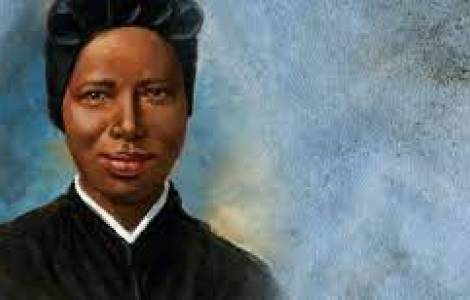
Vatican City (Fides News Agency) - The "vocation" of the oppressed, he said, is to liberate also their oppressors through the miracle of forgiveness, "opening paths of hope and making change possible". Pope Francis stressed this at today's Wednesday general audience in his catechesis on the figure of the slave saint Josephine Bakhita. In doing so, he continued the catechesis cycle dedicated to the passion of proclaiming the Gospel, recalling the incomparable story of the Sudanese saint to show how, in the Christian experience, forgiveness "becomes the source of a zeal that becomes mercy."
Born in 1869 in "martyred Darfur," the future saint was - according to the Pope - "abducted from her family at the age of seven and made a slave. She passed through eight masters, she suffered cruelty and violence from an early age, on her body she bore more than a hundred scars." "Often," the Bishop of Rome pointed out, "a wounded person wounds in turn; the oppressed easily becomes an oppressor."
In Bakhita, the gratuitous love of Christ had performed the miracle that freed her from the logic of resentment and hostility. Thus, Bakhita testified that "the vocation of the oppressed is to liberate themselves and their oppressors, thus becoming restorers of humanity" because "only in the weakness of the oppressed can the force of God's love, which frees both." By encountering the love of Jesus, also thanks to the contemplation of a small cross that she received as a gift, Bakhita experienced "an interior liberation" "because she felt understood and loved, and thus able to understand and love in her turn. This is the beginning".
Having become a Christian, Josephine Bakhita is transformed by Christ's words that she meditated on daily: 'Father, forgive them for they know not what they do. "If Judas had asked Jesus for forgiveness," said the future saint, "he too would have found mercy."
We can say that St. Bakhita's life became an existential parable of forgiveness. How beautiful to say of a person "she was capable, she was capable of forgiving always." And she was always capable of forgiving; indeed, her life is an existential parable of forgiveness. To forgive because then we will be forgiven. Do not forget this: forgiveness, which is God’s caress to all of us."
Forgiveness liberated her. Forgiveness first received through God’s merciful love, and then the forgiveness given that made her a free, joyful woman, capable of loving. Until the fulfillment of coming to live the service offered tirelessly to others "not as slavery, but as an expression of the free gift of self." Taken from her family and made a servant involuntarily," Pope Francis recalled in his catechesis, Bakhita "then freely chose to become a servant, to bear on her shoulders the burdens of others.
At the end of the general audience, during his greetings to the Italian-speaking faithful, Pope Francis again also spoke about the current situation in the Holy Land. "I continue to follow what is happening in Israel and Palestine with tears and apprehension"the Pope said, many people killed, others injured. I pray for those families who have seen a feast day transformed into a day of mourning, and I ask that the hostages be released immediately. It is the right of those who are attacked to defend themselves, but I am very concerned, the Pope continued, the total siege under which the Palestinians are living in Gaza, where there have also been many innocent victims. Terrorism and extremism do not help reach a solution to the conflict between Israelis and Palestinians, but fuel hatred, violence, revenge, and only cause each to other suffer. The Middle East does not need war, but peace, a peace built on dialogue and the courage of fraternity." (GV) (Fides News Agency 11/10/2023).